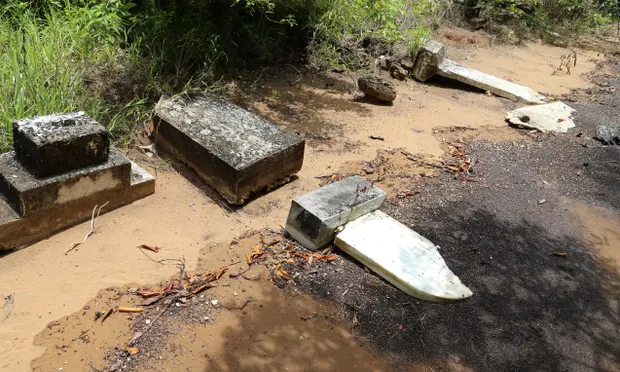“This island is me, and I am this island,” Wadhuam Pabai.
Pabai says of the homeland he’s known all his life.
“I can’t imagine being forced to leave Boigu … there are 65,000 years of wealth and experience here,” the father of seven says. Losing Boigu, his home in the Torres Strait, will mean losing all of it.
The islands of the Torres Strait – Zenadth Kes – are under existential threat from climate change. Seas are rising in the strait at twice the global average, and have risen 6cm in the last decade. Without urgent cuts the greenhouse gas emissions, projections forecast rises of up to a metre by the end of the century, bringing more extreme weather, erosion and inundation, and threatening fresh water supplies.
Pabai, and fellow islander Wadhuam (an honorific meaning ‘uncle’) Paul Kabai, are leading a class action on behalf of their island communities, arguing the commonwealth of Australia is acting unlawfully in failing to stop the climate change that, if unchecked, will destroy their homelands.
Their class action was filed in the federal court Tuesday, supported by the Grata Fund and the Urgenda Foundation. The case will argue the Australian government must cut emissions by 74% by 2030 (from 2005 levels) in order to save the Torres Strait Islands from sea level incursion, erosion, storm surge damage, and inhabitability. The Australian government, on Tuesday, committed to net zero emissions by 2050, but has not increased its pledged commitment of 26-28% cuts by 2030.
Kabai said his ancestors had lived on the islands for more than 65,000 years, and those living on the islands now held a cultural responsibility to protect country for future generations.
“The government’s failure to prevent the climate crisis means our islands could be flooded, our soils ruined by salt and our communities forced to leave. Becoming climate refugees means losing everything: our homes, our culture, our stories and our identity. If you take away our homelands, we don’t know who we are.”
Pabai and Kabai are both Gadamalulgal men and fathers of seven and eight children respectively. They are directors of the prescribed body corporates which represent the clans of their islands, Boigu and Saibai.
Boigu and Saibai are two of Australia’s northernmost inhabited islands – Saibai is just four kilometres from the island of New Guinea – they are flat and low-lying, about 1.5 metres above sea level. Already, they are regularly flooded by seawater, affecting houses, roads, graveyards and cultural sites, and gardens where people grow food.
The case before the federal court draws inspiration – if not direct precedent – from the Urgenda case in the Netherlands, where 886 plaintiffs argued the Dutch government had an obligation to protect its citizens from the impacts of climate change. That case, challenged all the way to the country’s supreme court by the government, succeeded at every level, with judges confirming an order directing the state to reduce greenhouse gases by the end of 2020 by at least 25% compared to 1990 levels.
The result was a dramatic shift in Dutch government policy – including the closure of coal-fired power stations, billions of euros of investment in renewable energy and energy efficiency, and binding commitments towards emissions reductions. Similar cases have followed in Belgium, Canada, Colombia, Germany, France, New Zealand, and elsewhere.
The Urgenda decision relied significantly on the European Convention on Human Rights – particularly articles two and eight, safeguarding the rights to life, and to a private and family life. That law does not apply to Australia, but lawyers will argue the commonwealth of Australia has a legal “duty of care” towards Torres Strait Islander peoples, arising both from negligence law and the Torres Strait Treaty and Native Title.
Isabelle Reinecke, founder and executive director of the Grata Fund, said the case was a question of fundamental rights.
“Everyone is entitled to defend their rights in court and we believe they have a great case that could make history.”
Reinecke said people across Australia, in particular First Nations communities, were already being harmed by the government’s failure to take the climate crisis seriously.
“We need to keep warming to below 1.5 degrees to save the Torres Strait Islands,” she told Guardian Australia. “If we do not do that it will be catastrophic for those islands, what we are looking at is a cultural genocide taking place, to use their words.”
Brett Spiegel, principal lawyer with Phi Finney McDonald, which is conducting the case, said the class action was being brought to require Australia to reduce greenhouse gas emissions to a level that will prevent Torres Strait Islanders from being forced from their homeland.
“The Australian government owes a legal duty to Paul, Pabai and all Torres Strait Islanders not to destroy their land, culture and identity, said Spiegel.
SOURCE: THE GUARDIAN/PACNEWS













